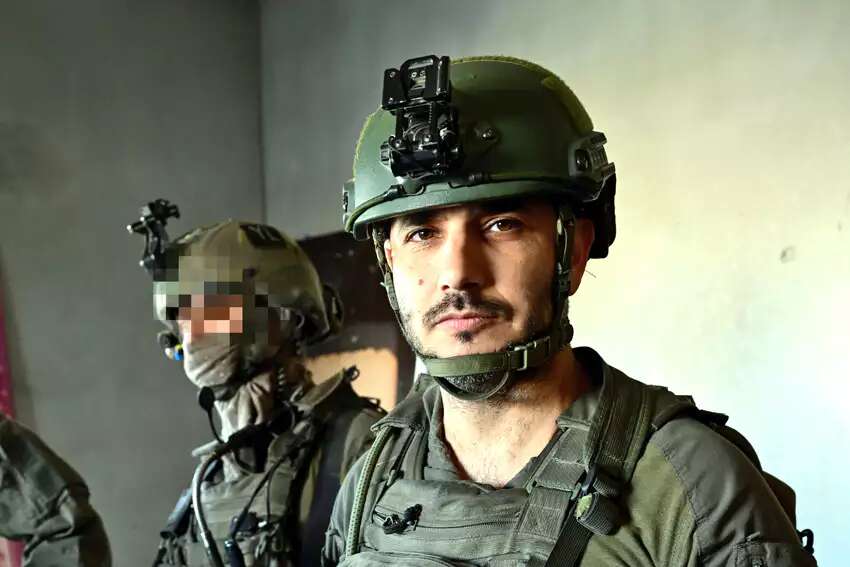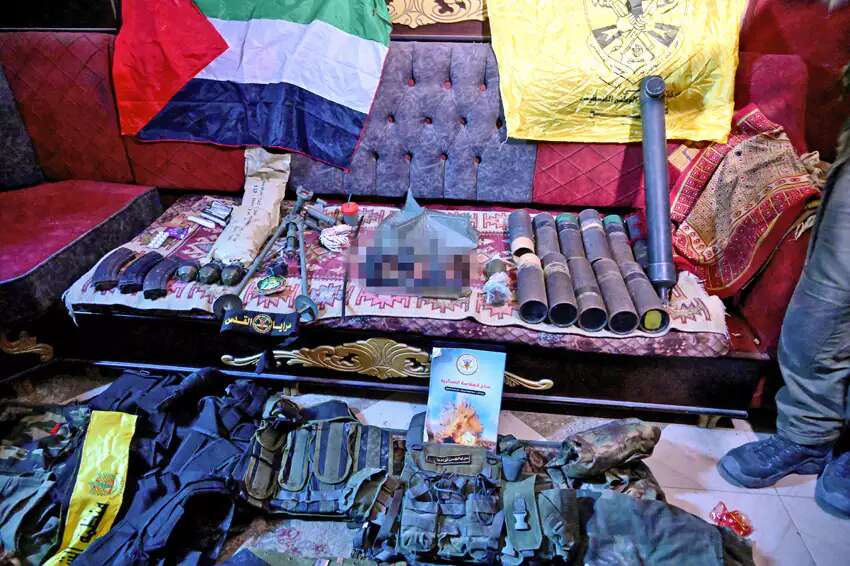At the beginning of the summer, Colonel Omer Cohen was appointed head of the Commando Brigade, which incorporates the IDF's elite units – Maglan, Egoz, and Duvdevan. A month later he embarked on Operation Bayit Vagan through the narrow alleys of Jenin, did not have time to even take off his helmet – and already entered full force into the Swords of Iron war.
Follow Israel Hayom on Facebook, Twitter, and Instagram
Since the outbreak of fighting on October 7, Colonel Cohen has been home for 12 hours of rest, of which he slept for six, and then hurried back to his soldiers. He missed the birthdays of his wife and three children but promised that would bring them victory as a compensation gift.
"I released an armored unit that fought with us," he says, "and in my closing speech, I said to the soldiers, 'What will victory on the day after look like – will rockets be fired from Gaza? Maybe. Will there still be terrorists there? Maybe. Will another generation of murderers grow up there? Almost certainly. But will we have collapsed Hamas' operational system? In the locations where we fought – without a doubt, yes.' You break down their ability to work as a system. Something else I said to them was that 'from my part, the most important thing is the unity of the Jewish People. Look after this human mosaic when you leave Gaza.'"
Last week we met in Khan Younis, just before he left with his officers to visit the Maglan unit's soldiers, who were holding down a zone of the crowded camp, and from there he said that we would go to the Egoz unit, who were deployed on a nearby compound. When he saw that we were wearing coats under our armored vests, he recommended that we take them off, "Believe me," he promised. "It is going to be hot there."
The method and the response
The officers were moving on foot into the deserted alleys of the gloomy refugee camp. It is hard to describe the level of destruction that one can see there. There is not a house that is not covered in holes from bullets and shells. Some houses were crushed and turned into dust. Abandoned dogs and cats wander the street and a drone that repeatedly announces that whoever remains there should go west, towards the sea, to protect their lives.
We entered the main street, and one of the soldiers hurried to throw a smoke grenade so that Hamas snipers would not hit us while moving. Within a short time, we reached Major G, the commander of the Maglan company, who only several hours earlier had, together with his soldiers, eliminated three terrorists, whose bodies were still lying a few meters from us.
In the video taken from the GoPro camera on the body of one of the terrorists, they were seen hiding in a small alley, from where they sent an innocent-looking person to the main street to see if there were any soldiers around. When he signaled that the coast was clear, they came out with an RPG, that was rolled inside a carpet to hide it.
Colonel Cohen explains the method: "They act like civilians, and when they recognize you, they enter one of the houses, arm themselves, shoot, throw away the weapon, and continue as if nothing happened. If I have intelligence information about their points of preparation and smart observations identify them ahead of time, we know to wait for them and strike."
Major G. says that his soldiers have killed about ten terrorists since the morning hours, and the brigade commander is proud to report that the young commander returned to them after being wounded by grenade fragments, some of which are still inside his body. "I have to command over 70 soldiers. They get injured and come back," explains the commander modestly. "Our unit has lost members, and they and the bereaved families are pushing us. They want us to continue for them."

Good competition
We had just left when we received a report about a dog from the unit that was killed and an encounter with a terrorist in a house next to a mosque, which we passed only a few moments ago. The brigade commander asks the officers to urgently return to headquarters to coordinate an attack with the assistance of the Israeli Air Force. "A somewhat complex event," he explains.
About fifteen minutes later, Colonel Cohen leaves the war room with a solution to the problem and announces that we are headed to a meeting with the Egoz unit, whose commander, Lieutenant Colonel M., who was seriously wounded on October 7, is returning to them this week. "There is good competition between the units of the brigade," he says while walking quickly, "and that is why part of the commander's responsibility is to preserve the unique nature of each. Every commander here is a lion, and you have to let him be successful. When you give regional boundaries, they do amazing things."
What is the difference between the units?
"They are all excellent raiding units that specialize in night fighting and fighting in built-up areas. They have a high firing capability in all types of antitank weapons, and each one has a specific purpose. Egoz is a guerilla unit that knows how to hit the enemy in places he didn't expect. Maglan is a collection, exposure, and attack unit that knows how to identify an enemy from a distance and destroy it. Duvdevan is a leader in fighting in built-up territory, and because of its target and challenges has returned to fight in Judea and Samaria.
We arrived at the Egoz compound where we were shown a Russian-made "Fagot" anti-tank missile from Russia, which was captured just recently. It is a new missile, in packaging, ready to operate. "Almost every house here is loaded with arms," explains Colonel Cohen. "After all, what was life like here beforehand? Terror and more terror, and hatred for the State of Israel. You can find it behind every closed door. You ask what is an existential war? It is an enemy you cannot exist next to."

We entered the neighboring house through an open door in one of the walls, so that the soldiers would not walk down the main street or enter through a door that might be boobytrapped. It was the home of a Hamas operative, who, in addition to festive chains that hung in honor of the birthday of one of the family members, also had a map of the Gaza surrounding settlements hanging on the wall and a variety of weapons on the bed.
"We are in the area of the Nasser Hospital," explains Major A., the operational officer of the Ezoz unit. "Here we found a 60 mm mortar, an IED, improvised grenades, and Kalashnikov ammo. In the last week, our unit killed about eighty terrorists or more in the camp compound and all of them were armed."
A well-oiled machine
Colonel Cohen says that in the past week, thousands of residents have walked south on the street we are walking on, and hundreds of terrorists were arrested from among them. Is it possible that hostages were also smuggled out within this crowd? The brigadier general says that they have not stopped thinking about it and Major D., an officer of the Maglan unit makes it clear: "Every morning we think about what happened here more than one hundred days ago, and that gives us the strength to keep going, regardless of how long we will be here. All of us dream of bringing all the hostages home."
The commando brigadier general remembers every second since October 7th, from the moment he was urgently summoned from his home until he reached the tunnel where the hostages were held – and the determination is only growing. "Planning evil is unfathomable," he emphasizes every word. "The building of the cages, the mechanism they created with logistics and services. You go inside there after a fierce fight and see children's drawings and women's clothes. You just can't let go."
"These are super-Nazis, and we continue to talk to the soldiers about values. We are not like them, we don't need to align our actions with evil. The commando soldiers know how to do their job properly."
We left Gaza late at night. Colonel Cohen was right; we didn't need a coat. The adrenaline and the fast running through the alleys were sufficient warm-up. We were there for one day, but he and his units have lost 32 soldiers since the fighting began, and they continue to operate like a well-oiled machine.
"I am so proud of my soldiers," concludes the 41-year-old brigadier general. "There are many heroes here, comrades who were killed and wounded, and their story has yet to be told. I am aware of the parents' concern, but first and foremost, we have a mission. We are determined. We are strong and want to win. As far as I am concerned, I am just the matchmaker."
Subscribe to Israel Hayom's daily newsletter and never miss our top stories!




